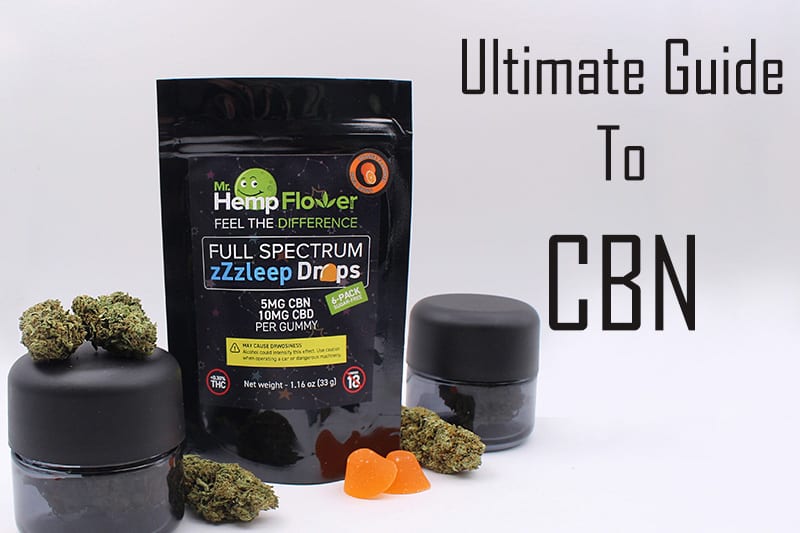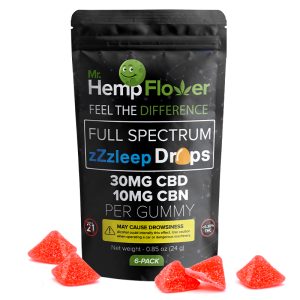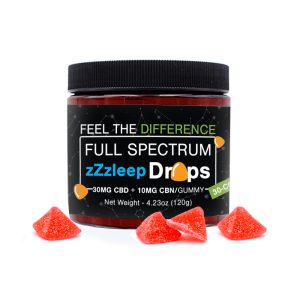Cannabinol (CBN) is one of the rarest hemp cannabinoids that shows plenty of potential benefits.
Cannabinol (CBN) is a mildly psychotropic cannabinoid found in mature hemp plants.
Recently, there has been a shift in focus from cannabidiol (CBD) to other cannabinoids, including cannabigerol (CBG) and cannabinol (CBN).
According to research, each cannabinoid has different potential uses and benefits — both as an isolated compound and as an entourage with other cannabinoids. Let’s take an in-depth look at CBN and why you shouldn’t sleep on this hemp cannabinoid.
Last Update: July 11, 2023
Article Summary
- Cannabinol (CBN) is a minor, mildly psychotropic hemp cannabinoid present in the plant in minuscule concentrations.
- CBN is created through THC’s degradation when exposed to heat or during prolonged exposure to oxygen.
- This cannabinoid interacts with the human body through the endocannabinoid system (ECS). Its binding process has yet to be confirmed, but it’s believed to bind primarily to the CB2 receptor and interacts with the CB1 receptor.
- The production of CBN in the hemp plant starts from cannabigerolic acid (CBGA), also known as the mother of all cannabinoids. CBGA converts into CBG, THCA, CBDA, or CBCA when exposed to heat (decarboxylation). With further exposure to air and light, THC breaks down into CBN.
- CBN has been touted for sleep due to its potential sedative effects. But, research has shown that this cannabinoid only shows potential sedative effects when combined with other cannabinoids and terpenes.
- This cannabinoid may cause a positive result on a drug test because it can increase the appearance of THC. Consuming THC-free hemp products with CBN can create a distorted picture of higher THC levels, potentially resulting in a positive drug test.
- CBN is similar to CBD and less potent than delta 8 THC, delta 9 THC, and HHC.
What is CBN?
Cannabinol (CBN) is a secondary cannabinoid found in the hemp plant — alongside THC and CBD. It’s considered mildly psychoactive or less than ten times the potency of THC.
Cannabinoids are the active chemical compounds responsible for the medicinal benefits of hemp. Although most cannabinoids are naturally present in the hemp plant, CBN is not.
CBN is a by-product of THC. It’s created during THC’s degradation (breakdown) when exposed to oxygen (overtime) or heat (immediate).
Because of this, the concentration of cannabinol in raw marijuana is typically 1% or less, while the hemp plant contains lower amounts.
Old cannabis contains higher levels of CBN compared to freshly harvested cannabis which has almost no presence because THC degradation is yet to happen.
Will CBN Get You High?
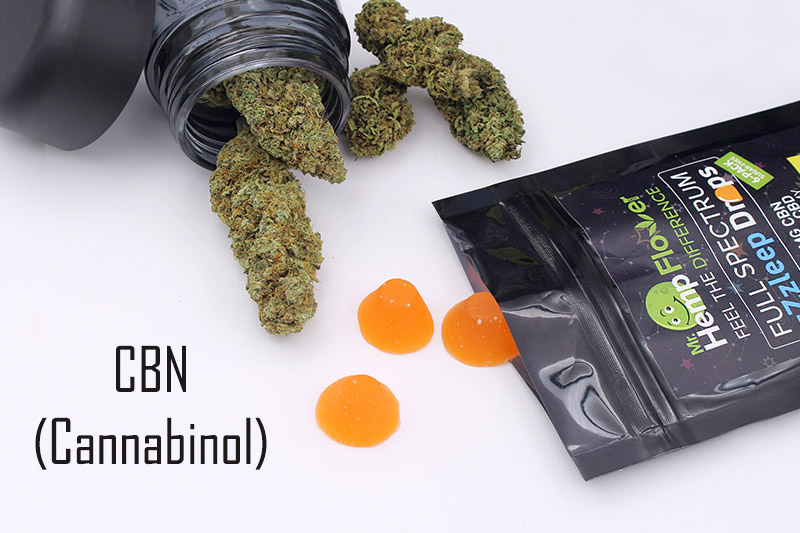
Cannabinol (CBN) is the first cannabinoid isolated from cannabis.
In 1896, researchers Wood, Spivey, and Easterfield isolated CBN from a red oil cannabis extract. R.S. Cahn clarified CBN’s molecular structure in the early 1930s, and its chemical synthesis was first achieved in 1940 in the laboratories of two separate research groups — one by R. Adams in the United States and the other one by Lord Todd in the United Kingdom. [1].
Prior to discovering THC, scientists thought that CBN was responsible for the intoxicating effects of cannabis. But, although it may show some psychotropic properties, CBN doesn’t have the potency to get you high.
Some studies suggest that CBN is not psychotropic, while others reveal that CBN has mild psychotropic effects. Research shows that CBN is slightly more psychotropic than CBD — which is not psychotropic at all — and up to ten times less psychotropic than THC.
The Importance of Proper Storage of Hemp Flower
If you’ve just ordered some THCa hemp flower, you need to know about the connection between CBN, THC, and proper storage.
The link between CBN and THC goes back to a 1999 study, which found that cannabis loses its potency over time. The study reported that after four years, the THC content in the tested cannabis sample dropped to half of its original potency.
The researchers noticed that as THC oxidized, it began to convert to CBN, revealing that the first years of improper storage were critical for the majority of the degradation.
In conclusion, the study found that THC degrades into CBN over time, and the longer it ages, old cannabis will become richer in CBN.
How Does CBN Work in The Body?
The hemp plant contains over 100 cannabinoids that interact with the human body through the endocannabinoid system (ECS). The ECS is a newly discovered system of neurotransmitters that maintains homeostasis (balance) in the body.
Each cannabinoid interacts with the endocannabinoid system in a different way — primarily through its CB1 and CB2 receptors. The majority of these receptors are located in the brain and nervous system, and immune system, respectively.
Every cannabinoid has a unique set of health benefits it creates in the body.
CBN, in particular, shares a similar chemical composition to THC. The binding process of this cannabinoid has yet to be confirmed, but it is believed that CBN primarily binds to the CB2 receptor but also interacts with the CB1 receptor.
This cannabinoid acts as an agonist (a chemical that binds to a receptor and activates the receptor to produce a biological response) to the TRPV2 receptor.
The TRPV2 receptor is found in the spleen and lymphocytes (white blood cells crucial to the immune system that produce antibodies and destroy cells that could cause damage) and plays an important role in the immune system.
CBD interacts with the endocannabinoid system by increasing the production of its own endocannabinoids to promote homeostasis. CBN seems to have a higher affinity to both CB1 and CB2 receptors to produce its effects.
How is CBN Produced in Hemp Plants?
CBN is produced in the hemp plant as most major cannabinoids — from the cannabigerolic acid (CBGA), also known as the mother of all cannabinoids.
But, the difference between CBN and other cannabinoids is that CBN does not come directly from CBGA.
1. Decarboxylation
CBGA is the first cannabinoid formed by the hemp plant, which under the influence of natural enzymes, turns into cannabigerol (CBG), tetrahydrocannabinolic acid (THCA), cannabidiolic acid (CBDA), or cannabichromenic acid (CBCA). When exposed to heat (decarboxylation), these acid forms convert into THC, CBD, and CBC, respectively.
Gradual air and light exposure cause THC to break down into CBN, which is why older cannabis has a higher percentage of CBN compared to freshly harvested cannabis, where CBN is nearly untraceable.
2. Natural Oxidation
CBN can be produced through another natural pathway.
When exposed to air or UV lights from the sun for a significant period of time, THCA (the acidic form of THC) loses hydrogen molecules (oxidation) and converts to CBNA. Decarboxylation (heat exposure) of CBNA is further used to create CBN.
Potential Benefits and Uses of CBN
DISCLAIMER
MrHempflower.com (MHF Group Inc) makes absolutely no medical claims about CBN. No information in this article is to be used as medical advice. All potential benefits listed below are cited and linked to a study where the information is provided. Always consult a doctor before taking or using CBN. 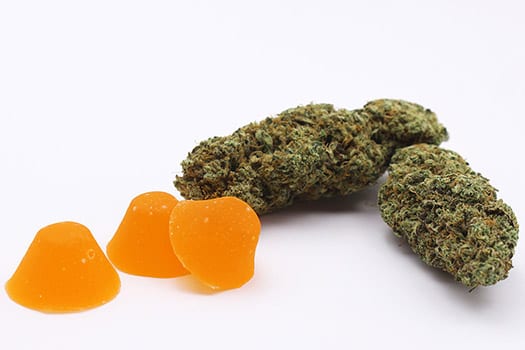
As one of the main cannabinoids in hemp, researchers have investigated the effects of CBN, usually in combination with other cannabinoids.
Although more research is needed, here are some potential benefits of this cannabinoid:
1. Sedative Properties
Although a few small studies have reported that CBN is a powerful sedative that shows potential in the treatment of insomnia, current evidence shows that CBN does not show sedative qualities — at least not when consumed as a single compound.
One human study performed in the 1970s found that CBN showed potential sedative effects when used in combination with THCA. This can be attributed to the entourage effect, where cannabinoids and terpenes work together to create a more potent effect [2].
The reason why it was believed that CBN has a sedative effect is that users have reported feeling “sleepy” each time they used aged cannabis. The sedative effect was likely misattributed to CBN.
So, Can CBN Help With Sleep?
According to Dr. Ethan Russo, a neurologist, and psychopharmacology researcher, the sedative effects of old cannabis most likely come from “aged” terpenes instead.
Russo explains that in aged cannabis, there is a loss of monoterpenoids and retention of sesquiterpenoids that likely give the sedative effect. So, aside from the entourage effect, CBN has not been shown as a sedative on its own.
2. Pain Management
CBN is a potential painkiller that releases peptides from sensory nerves, which activate an alternative nerve mechanism from the one used by CBD and THC.
CBN is considered a weak CB1 partial agonist, meaning it binds to the receptor but doesn’t produce the same effects as a full agonist. CBN has been shown to produce only 10% of the activity of THC, hence the alternative nerve mechanism to pain elimination [3].
3. May Reduce Intraocular Pressure
One animal study found that chronic administration of cannabinol (CBN) causes a significant reduction in intraocular pressure — one of the biggest risks for glaucoma [4].
More research is needed in this area, as CBN hasn’t shown superior results to glaucoma medications.
4. Potential Anti-inflammatory Effects
The anti-inflammatory effects of cannabinoids have been investigated in several reputable studies, which have shown that cannabinoids can be effective anti-inflammatory components.
Cannabidiol (CBD) and tetrahydrocannabinol (THC) have been touted as the main anti-inflammatory agents.
But, studies show that cannabinol is also in the group of compounds with the potential to become a novel class of therapeutic agents for the treatment of inflammatory conditions [5].
One animal study discussed the anti-inflammatory effects of cannabinoids on arthritis, including CBN. The study concluded that CBN could be effective against certain anti-inflammatory conditions [6].
5. Antibacterial Properties of CBN
Extensive research has shown that cannabinoids are potent antibacterial agents, and CBN is not an exception. A 2008 study investigated the potential of cannabinoids to address antibiotic resistance.
The study showed that cannabinol (CBN) showed potent activity against a variety of methicillin-resistant Staphylococcus aureus (MRSA) strains, which means they may be a viable option to fight bacteria [7].
6. May Stimulate Appetite
A 2012 animal study found that CBN may be an effective appetite stimulant and can provide a non-psychotropic alternative to THC-based medicines [8].
Cannabinol increases food consumption and duration of feeding in rats and might be a potential replacement for THC (an appetite stimulant that many avoid because of its psychotropic effects) and give someone “the munchies” without the high.
7. Anticonvulsant Effects
Cannabinoids are known anticonvulsants — CBD is an active component in an FDA-approved epilepsy drug. Studies show that when used together, CBN, THC, and CBD were more effective in this area compared to when used as isolated compounds [9].
8. Potential Neuroprotectant
Although further research is needed, CBN may show neuroprotective benefits.
In one study, researchers tested the effects of CBN (as the non-psychotropic alternative to THC) on a rodent model of amyotrophic lateral sclerosis (ALS) [10].
The researchers found that the treatment with CBN significantly delayed disease onset by more than two weeks. This could potentially mean that CBN may help fight common neurodegenerative conditions where treatment is limited.
Risks and Side Effects of CBN
Although more research is needed, cannabinol has a great safety profile and is mostly harmless. Keep in mind that you can’t exactly know how this compound will affect your body.
If consumed in large doses, this cannabinoid may show some side effects, including:
- Tiredness
- Drowsiness
- Dizziness
- Loss of appetite
- Sedation
Can CBN Cause a Positive Result on a Drug Test?
Yes, CBN might cause you to fail a drug test.
A 2019 study by the University of Utah Health Sciences Center has found that people taking CBD won’t fail a drug test, but those taking CBN will [11].
Potential explanations for these findings are that CBN can increase the appearance of THC in drug tests.
This means that even if you consume THC-free hemp products and have undetectable levels of THC in your system, the presence of CBN can create a distorted picture of higher THC levels. Depending on your test’s sensitivity, this could result in a positive drug test.
How is CBN Extracted?
Unlike THC and CBD — which can be extracted directly from the hemp plant — CBN can only be extracted by using a post-processing technique applied after the first extraction.
The hemp flower goes through the first extraction process that produces a pure full spectrum phytocannabinoid-rich (PCR) oil. After that, our team applies heat and oxygen exposure to the extracted material in order to create a concentrated product such as CBN oil.
The post-processing technique (heat and time) used to isolate this compound and create high-quality oil makes CBN products more unique and, in most cases, more expensive.
Buy Quality CBN Products at Mr. Hemp Flower
Aging your hemp or marijuana buds may not be the best way to get CBN.
The conversion process of CBN requires the right amount of factors, such as heat, air, light, and time, which are best navigated in a more controlled environment.
One of the biggest downsides of aging hemp buds is that you’ll get an unpleasant taste when vaping or smoking them.
Luckily, products such as Mr. Hemp Flower’s CBN oil and CBN-infused gummies — that are rich in CBN and a rare spectrum of cannabinoids — will provide you with the needed dose of CBN.
CBN’s Entourage Effect
The lab analysis for our CBN products shows around 20 other “mystery” cannabinoids that have yet to be discovered and researched. But, these cannabinoids and terpenes can have a potential contribution to the effects of CBN.
The idea that all cannabinoids and terpenes work together to create more potent effects is rooted in the theory of the “entourage effect.”
As mentioned earlier, research suggests that as a standalone molecule, CBN does not showcase sedative effects. But, when combined with other cannabinoids and terpenes, this component may show potential sedative effects.
Our CBN gummies are infused with full spectrum oil that contains 10+ mg CBN and 30 mg CBD.
CBN-rich products make it easier for you to dose and notice the effects of this unique cannabinoid. In combination with CBD and terpenes such as myrcene and limonene — which are present in our CBN gummies and oil — CBN can potentially help your body relax before sleep.
According to research, the two most abundant terpenes in hemp — myrcene and limonene — can increase sleeping time in mice [12].
The source of the CBN extract matters, and at Mr. Hemp Flower, we keep our standards high.
We believe it’s vitally important that our CBN extracts come from hemp cultivated in the best U.S. soil. We only work with licensed growers dedicated to sustainable and organic cultivation practices.
When you’re buying your CBN gummies, you can rest assured you are getting a quality product that comes from an extract made from fresh hemp plants with high cannabinoid and terpene content.
Comparison of CBN to Other Hemp Cannabinoids
Here’s how cannabinol (CBN) compares to other hemp cannabinoids, including CBD, delta 9 THC, delta 9 THC, and HHC.
CBN vs. CBD
CBN is more similar to CBD than THC, despite being derived from delta 9 THC.
Cannabidiol is the main non-intoxicating cannabinoid in hemp and its most popular and beneficial compound. CBN is slightly more intoxicating than CBD, so that’s one of their differences.
Both cannabinoids interact with the endocannabinoid system through CB2 receptors. These receptors are mostly associated with the regulation of the immune system.
CBN and CBD show potential therapeutic benefits, but CBD’s are better explored. Regarding side effects, both CBN and CBD have very few minor side effects.
If you want to try premium, high-quality CBD, check out our full spectrum CBD product line.
CBN vs. Delta 9 THC
Delta 9 THC is the primary intoxicating cannabinoid in cannabis.
CBN is much less potent than THC, around 10% of its potency. As mentioned earlier, CBN is a by-product of THC’s degradation when exposed to heat or oxygen due to aging.
Both THC and CBN interact with the endocannabinoid system. THC has a higher binding affinity with the CB1 receptor than CBN, whose activation is believed to cause intoxication in the user.
If you want to try legal delta 9 THC, check out our potent and delicious delta 9 Gummies.
CBN vs. Delta 8 THC
Delta 8 THC is another THC isomer with psychoactive properties.
CBN is less potent than delta 8 THC, and delta 8 is considered to be around 50% of delta 9 THC’s potency. Delta 8 THC occurs naturally in the hemp plant in minuscule amounts.
Compared to delta 9, delta 8 produces milder effects, and is more relaxing and is similar to CBN in that sense.
For premium delta 8 THC, check out our vegan, organic delta 8 THC gummies.
CBN vs. HHC
Hexahydrocannabinol (HHC) is the hydrogenated form of THC.
Similarly to CBN, HHC is a minor cannabinoid present in minuscule amounts in the plant. HHC is much more potent than CBN as it’s considered around 80% of THC’s potency.
HHC can be created in a lab from THC through the process of hydrogenation. This process includes breaking down THC’s double bond and saturating it with hydrogen.
If you want to try HHC, check out our potent and delicious HHC gummies.
Is CBN Legal?
Unlike CBD, the legality of CBN may be less complicated and problematic. There are a few reasons why:
CBN can be legally produced under the 2018 Farm Bill
The 2018 Farm Bill legalized hemp and its cannabinoids, so technically, CBN can be lawfully extracted from hemp. Also, CBN is not on the list of controlled substances in the U.S. or internationally.
CBN is likely to be exempt from the FDA’s “drug exclusion rule”
The Food and Drug Administration (FDA) has the authority to regulate cannabis-derived compounds and products that contain cannabis.
Once CBD has been approved as an active compound in a drug for treating epilepsy by the FDA, CBD became a non-exempt drug, and now, it cannot be marketed under health claims or as a dietary supplement.
That’s not the case with CBN.
According to the FDA, “parts of the cannabis plant that do not contain THC or CBD might fall outside the scope” of the drug exclusion rule. This simplifies things when it comes to legality and marketing of CBN products.
CBN can be marketed as a dietary supplement
Many companies are marketing CBN products as dietary supplements.
Even if the FDA at a certain time decides to approve CBN as a drug, the drug exclusion rule will likely not apply to this cannabinoid.
The rule does not include substances that have been marketed as foods or dietary supplements before being clinically investigated by the FDA.
CBN FAQ
Will CBN get me high?
No. CBN won’t get you high. Compared to THC, it only showcases mild (or no) psychotropic effects that aren’t strong enough to get you stoned.
Is CBN legal?
Yes, CBN can be lawfully extracted from the hemp plant under the 2018 Farm Bill, which legalized hemp and its cannabinoids. Unlike THC and CBD, CBN was/is not listed on the controlled substances list in the U.S. or internationally.
What's the difference between CBD and CBN and flowers?
Cannabidiol (CBD) and cannabinol (CBN) are two different cannabinoids with separate origins. The hemp plant is naturally rich in CBD, while the level of CBN in a hemp flower depends on the extraction process and heat exposure.
Why would someone use CBN?
CBN is one of the rarest cannabinoids in hemp and acts as a neuroprotectant, anti-inflammatory and antibacterial agent, and may stimulate appetite or help with sleep. CBN shows these benefits when working in combination with other cannabinoids and terpenes rather than as an isolated compound.

